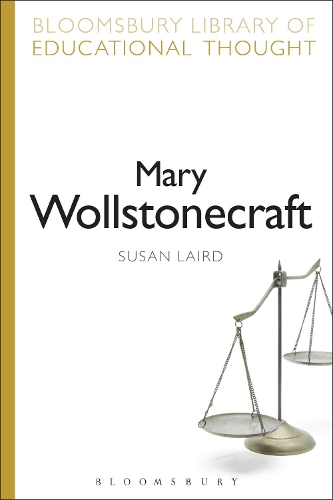
Mary Wollstonecraft
(Paperback)
Available Formats
Publishing Details
Mary Wollstonecraft
By (Author) Susan Laird
Series edited by Professor Richard Bailey
Bloomsbury Publishing PLC
Bloomsbury Academic
23rd October 2014
United Kingdom
Classifications
Tertiary Education
Non Fiction
370.92
Physical Properties
Paperback
272
Width 156mm, Height 234mm
412g
Description
Best known as author of A Vindication of the Rights of Woman (1792), if not also as mother of Frankensteins author Mary Shelley, Mary Wollstonecraft survived domestic violence and unusual independent womanhood to write engaging letters, fiction, history, critical reviews, handbooks and treatises. Her work on coeducational thought was a major early modern influence upon the development of a post-Enlightenment tradition, and continues to have vital relevance today. Celebrated as an early modern feminist, abolitionist and socialist philosopher, Wollstonecraft had little formal schooling, but still worked as a governess, school-teacher and educational writer. This succinct critical account of that prolific research begins by recounting her revolutionary self-education. Susan Laird explains how Wollstonecraft came to criticize moral flaws in both mens and womens private education based on irrational assumptions about sexual character under the Divine Right of Kings. It was to remedy those moral flaws of monarchist education that Wollstonecraft theorized her influential, but incomplete, concept of publicly financed, universal, egalitarian coeducation.
Reviews
There can be little doubt that Lairds book will itself, become an integral and important part of future conversations about the life and philosophy of Mary Wollstonecraft. To my knowledge, there is no more careful, imaginative, provocative scholarship on the coeducational thought of Mary Wollstonecraft than Lairds. -- Suzanne Rice, University of Kansas, USA
Susan Lairds superb study of Mary Wollstonecraft succinctly examines her biography and role as a pioneer of feminism in order to fill in a neglected area in discussions of her achievement by addressing her revolutionary theories of coeducation. Laird masterfully analyzes her subjects prescient argument for the free national education of children that integrates students without regard to gender or class. She demonstrates the ongoing relevance of Wollstonecrafts legacy for 21st century educators, offering them a fresh perspective on traditional and contemporary educational thought. -- Beth Darlington, Professor of English, Vassar College, USA
Susan Lairds sympathetic reading of Wollstonecraft guides non-specialist readers through the stylistic and contextual challenges of Wollstonecrafts writing, and her insightful and imaginative analysis of Wollstonecrafts influence on the development of co-educational theorizing invites contemporary readers to reflect on the problem of influence in feminist educational thought. -- Natasha Levinson, Associate Professor, Cultural Foundations of Education, Kent State University, USA
Mary Wollstonecraft is a much-needed contribution the history of educational thought. Situating Wollstonecrafts work within its social, political, psychological and aesthetic landscape, Susan Laird has provided a critically astute rereading of coeducation that has significant implications for contemporary theory and practice. -- Susan Douglas Franzosa, Professor of Educational Studies, Fairfield University, USA
Author Bio
Susan Laird is Professor of Educational Leadership and Policy Studies, Womens and Gender Studies, and Human Relations at University of Oklahoma, US, where she is also graduate program coordinator in Educational Studies. She is a past president of the Philosophy of Education Society and co-founder of the Society for Educating Women. Editor of Philosophy of Education 1997 and author of many articles and book chapters, she is best known for her philosophical and literary studies of education, gender, aesthetics and food ethics.
